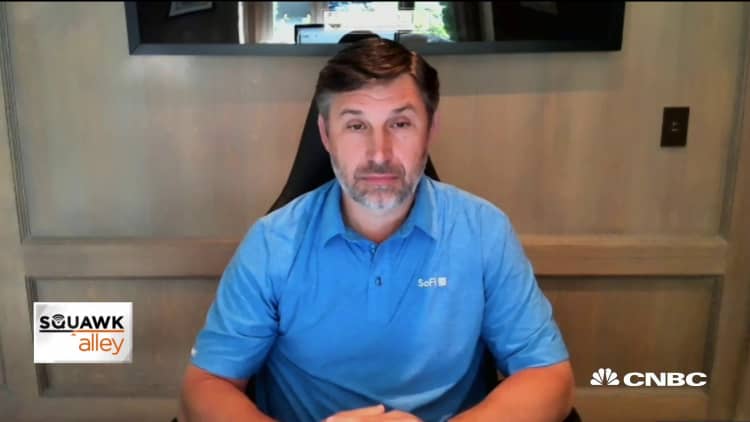Fintech company SoFi has filed an application for a national bank charter with the Office of the Comptroller of the Currency (OCC), according to a report from Business Insider citing a company-wide email it reviewed. In that email, CEO Anthony Noto said that the personal finance start-up "thought long and hard about embarking on this path, and are proud of what we have accomplished in the last 2+ years to position ourselves to take this next critical strategic step in our development."
If granted, the move would allow SoFi, which ranked No. 8 on the 2020 CNBC Disruptor 50 list, to operate under one set of federal regulations, rather than 50 different state regulations. In addition to unifying regulatory operations, the charter would allow SoFi to lend money and accept deposits independent of the partner banks it currently works with, as well as offer more competitive interest rates for its suite of loans, checking and savings offerings.
The company previously applied in 2017 for a bank license in Utah with the FDIC under co-founder and former CEO Mike Cagney, who resigned later that year amid sexual harassment allegations made by two former SoFi employees. Following the departure of Cagney and other senior executives, the company withdrew its application later that year.
A SoFi spokeswoman confirmed to CNBC it has formally submitted an application to the OCC for a proposed de novo national bank, SoFi Bank, National Association.
The company chose the "de novo" path because it will allow SoFi to take insured consumer deposits. It is the first step in a process that, upon approval, would then be reviewed and need approval from the FDIC and Fed as well.
"We firmly believe that by pursuing a national bank charter, we will be able to help even more people get their money right with enhanced value and more products and services," Noto said in a statement emailed to CNBC.
Just last year, Robinhood, another growing fintech company, sought to become a federally insured bank before voluntarily pulling back its charter application, highlighting tech's ongoing struggle to disrupt the banking industry. However, the coronavirus pandemic has helped usher in a new wave of investors through online brokerages including Robinhood, as well as a wave of consolidation in the sector involving competitors TD Ameritrade and E-Trade, now part of Charles Schwab and Morgan Stanley, respectively.
SoFi has seen the number of its investor accounts double in 2020, Noto previously told CNBC. Robinhood, which offers a free basic stock trading account via its app, has seen accounts grow from one million to 10 million since 2016. It ranked No. 46 on this year's Disruptor list.

In April, SoFi announced plans to acquire payments software company Galileo, which powers platforms like Robinhood and Chime. The move was a nod to comments that Noto made last November about the imminence of industry consolidation.
"We assumed there's going to be a fair amount of consolidation" in the industry, he told CNBC's Jim Cramer said in a "Mad Money" interview. "The financial services industry really hasn't had the type of innovation that you've seen in e-commerce, as you've seen in online travel."
The company claims to have 1 million members and has made $45 billion in loans to date. SoFi has raised $2.3 billion in funding and is valued at around $4.8 billion.
SoFi is a six-time CNBC Disruptor 50 company.






